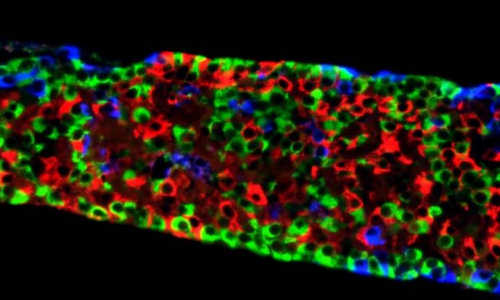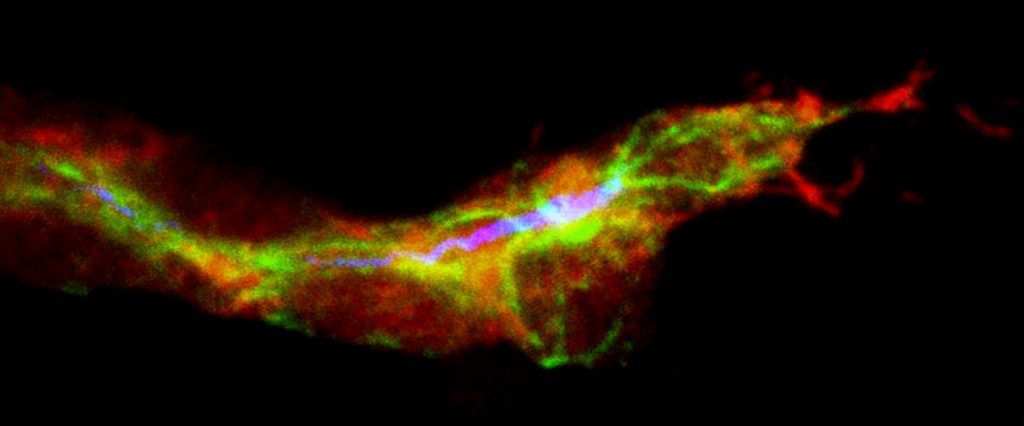A combination of human stem cell transplantation and antidiabetic drugs proved to be highly effective at improving body weight and glucose metabolism in a mouse model of type 2 diabetes. The findings, published March 19th by Stem Cell Reports, could set the stage for clinical trials to test the first stem cell-based approach for insulin replacement in patients with type 2 diabetes.
This is an image of macro-encapsulated pancreatic endocrine cells derived from human embryonic stem cells. Devices were harvested at 29 weeks post-transplant and immunofluorescent staining was performed for insulin (red), glucagon (green), and somatostatin.
Type 2 diabetes, which accounts for 90%-95% of the now approaching 400 million cases of diabetes worldwide, is currently treated by oral medication, insulin injections, or both to control blood glucose levels. However, insulin delivery is imprecise, onerous, and often promotes weight gain, while drugs do not work in some patients and may cause gastrointestinal problems or low blood glucose levels, highlighting the strong need for better treatment options.
To address this need, senior study author Timothy Kieffer of the University of British Columbia collaborated with BetaLogics, a division of Janssen Research & Development, LLC, and tested a promising stem cell transplantation approach.
First, they fed mice a high-fat diet to induce obesity, low responsiveness to insulin, and high blood glucose levels–the hallmarks of type 2 diabetes. The mice then received transplants of encapsulated pancreatic progenitor cells derived from human embryonic stem cells. These transplanted cells matured into insulin-secreting beta cells, resulting in improvements in insulin sensitivity and glucose metabolism. Moreover, stem cell transplantation combined with currently available antidiabetic drugs resulted in rapid weight loss in the mice and more significant improvements in glucose metabolism compared with either treatment alone.
Moving forward, the researchers will use their mouse model of type 2 diabetes to test the effectiveness of transplanting more mature insulin-producing cells that could potentially reverse symptoms of diabetes faster and at a lower dose compared to pancreatic progenitor cells.
A similar stem cell-based transplantation approach recently obtained clearance from the US Food and Drug Administration and Health Canada to be tested in patients with type 1 diabetes in phase1/2 clinical trials sponsored by a regenerative medicine company called ViaCyte.
“Success in these clinical trials could pave the way for testing in patients with type 2 diabetes,” Kieffer says. “Our hope is that a stem cell-based approach to insulin replacement will ultimately improve glucose control in patients with both type 1 and type 2 diabetes, resulting in healthier, longer lives.”
Story Source:
The above story is based on materials provided by Cell Press.





